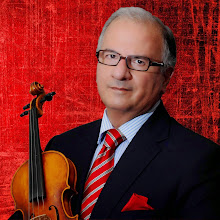 Maria Callas (1923 – 1977) was an American-born Greek soprano and perhaps the best-known opera singer of the post World War II period. She combined an impeccable bel canto technique with great dramatic gifts, making her the most famous singing actress of the era. An extremely versatile singer, her repertoire ranged from classical opera seria, such as Spontini's La Vestale to late Verdi and the verismo operas of Puccini.
Maria Callas (1923 – 1977) was an American-born Greek soprano and perhaps the best-known opera singer of the post World War II period. She combined an impeccable bel canto technique with great dramatic gifts, making her the most famous singing actress of the era. An extremely versatile singer, her repertoire ranged from classical opera seria, such as Spontini's La Vestale to late Verdi and the verismo operas of Puccini.Born Maria Anna Sofia Cecilia Kalogeropoulos to Greek parents in Brooklyn, New York, she moved with her mother to Athens, Greece at the age of 13. There she received her musical education and became a pupil of the well-known soprano Elvira de Hidalgo at the Athens Conservatory. After a few appearances as a student and in secondary roles, she made her professional debut at the Athens Opera on July 4, 1941, as Tosca, going on to sing Santuzza and Leonora during the next three years. In 1947, Callas made her Italian debut at the Verona Arena in La Gioconda under the baton of Tullio Serafin. Together with Serafin, Callas subsequently recorded and performed many bel canto operas, contributing greatly to the bel canto revival of the 1950s.
Throughout the 1950s, Callas made numerous appearances at the world's great houses: La Scala in Milan, Opera Garnier in Paris, the Metropolitan Opera in New York City, Dallas Opera (Dallas, Texas), Royal Opera House in London, Mexico's Palacio de las Bellas Artes, and the Teatro Colón in Buenos Aires. By the mid 1950s, strain on her voice started to become apparent; by 1958 it reached a point where she was no longer suitable for many roles. Her later stereo recordings evidence masterly musical interpretations with an increasingly unstable higher register that wobbled uncontrollably at times. Her last new production at La Scala was Donizetti's Poliuto in 1960. The role was well chosen for her vocal capacities. The premiere was on La Scala's traditional opening day, 7th December, Saint Ambroise Day. It was a great success and is still remembered today as a model.
In her final years as a singer, there were performances of Medea, Norma and Tosca , most notably her Paris, New York, and Royal Opera House Covent Garden "Tosca"s of January/February 1964 and, her last performance on stage, on 5th July 1965 at Covent Garden.
Callas was romantically involved for many years with the Greek shipping tycoon Aristotle Onassis, and their love affair received much publicity. She was introduced to him in 1957, after a performance in Donizetti's Anna Bolena, at a party given in her honor by Elsa Maxwell. In November 1959, she left her husband, Giovanni Battista Meneghini, for Onassis. According to one of her biographers, Nicholas Gage, Callas and Onassis had a child, a boy, who died hours after he was born on March 30, 1960. The relationship ended nine years later, when Onassis left Callas for Jacqueline Kennedy, widow of assassinated US president John F. Kennedy.
Heartbroken ("First I lost my voice, then I lost my figure and then I lost Onassis," she once said), Callas spent her last years living largely in isolation in Paris, and died in 1977 from a heart attack at the age of 53. The funeral service was held at the Greek Orthodox Church on Rue Georges-Bizet on September 20, 1977, and her ashes were buried in the Père Lachaise cemetery. After being stolen and later recovered, they were scattered into the Aegean Sea, off the coast of Greece.
In late 2004, opera and film director Franco Zeffirelli made a bizarre claim that Callas may have been murdered by her female lover, Greek pianist Vasso Devetzi, motivated by Callas' $9,000,000 USD estate. As Devetzi carried out Callas' wishes in founding the Maria Callas Foundation, which provides international scholarships for young singers, this seems unlikely. A more likely explanation is Callas' overuse of quaaludes. Devetzi may have conned Callas' sister, Lakintha, into signing her share of the estate over to herself.
Greatly admired by many opera fans, disliked by others, Callas was a controversial artist. Her supporters called her "La Divina" and raved about the dramatic intensity and ravishing portayals she brought to the opera stage. Callas' detractors believed that she regularly pushed her voice beyond its natural limits, achieving her dramatic effect at the expense of beauty of tone.

Very well written, Farya. I know that La Callas was also a great actress on the stage. It is impossible to please both Greek and Troyes, as we say here... I am learning a few about opera, and I compaired Callas with other great sopranos in the aria "O mio babbino caro". She was great!
ReplyDelete